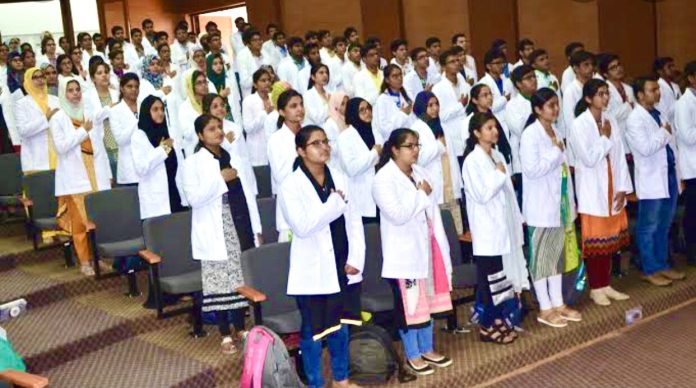The Tamil Nadu health department on May 1 removed the dean of a medical college from his post a day after first-year students there took the Maharshi Charaka Shapath instead of the Hippocratic Oath. After the incident, Dr A Rathinavel, the dean of the Madurai Medical College, was placed on the waiting list. The state health department said that the act was “strongly condemnable”. A departmental inquiry was ordered against the dean for allegedly violating rules, said state health minister Ma Subramanian. However, according to media reports, the dean was later given a warning and reinstated in the same post after the intervention of Chief Minister MK Stalin.
On April 2, the National Medical Commission had recommended that the Charaka Shapath should replace the Hippocratic Oath in MBBS courses. However, Union Health Minister Mansukh Mandaviya said in Parliament that the Charaka Shapath would be optional and would not be forced on students.
On April 30, the first-year students of the college were made to take the Maharshi Charaka Shapath from a Sanskrit text, instead of the conventional Hippocratic Oath in English.
The incident took place in the presence of state finance minister PTR Palanivel Thiaga Rajan and commercial taxes minister P Moorthy. Rajan immediately objected to the oath being taken in Sanskrit and expressed his concern at the move. He even took to the microphone and said that he was shocked when he heard the new oath. “I always thought that the doctors took a Hippocratic oath. In fact, I’ve been recommending politicians to take the same oath,” he was quoted as saying.
Subramanian told the media: “I have attended the oath-taking ceremonies in Tiruvallur, Nilgiris and a few other colleges where students took the Hippocratic Oath. That is the practice in Tamil Nadu. Who gave anyone the permission to change this long-held tradition? How can a language which people don’t even know how to pronounce be used by students?”
The Hippocratic Oath, attributed to ancient Greek physician Hippocrates, is an ethical code that medical students swear to uphold when they take up the profession.
According to translations of the oath, it reads:
“I will use treatment to help the sick according to my ability and judgement, but I will never use it to injure or wrong them.”
“I will not give poison to anyone though asked to do so, nor will I suggest such a plan. Similarly, I will not give a pessary to a woman to cause abortion. But in purity and in holiness I will guard my life and my art.”
“I will not use the knife either on sufferers from stone, but I will give place to such as are craftsmen therein.”
“Into whatsoever houses I enter, I will do so to help the sick, keeping myself free from all intentional wrongdoing and harm, especially from fornication with woman or man, bond or free.”
“Whatsoever in the course of practice I see or hear (or even outside my practice in social intercourse) that ought never to be published abroad, I will not divulge, but consider such things to be holy secrets.”
The Hippocratic Oath is administered to medical students when they transition from pre-clinical to clinical subjects, during what is known as the white coat ceremony. On the other hand, the Charaka Shapath, or Charaka oath, is derived from a passage in the Charaka Samhita—a Sanskrit text on Ayurveda. The passage has dos and don’ts for medical students. Written in Sanskrit and translated into Hindi and English, a quote from Charaka Shapath says: “Not for the self, Not for the fulfillment of any worldly material desire or gain, But solely for the good of suffering humanity, I will treat my patient and excel all.”
The proposal to replace the Hippocratic Oath with Charak Shapath was that “Charak belonged to our motherland—oath-taking to be conducted during White Coat Ceremony in local languages/vernaculars.” The proposed change had created a row, as the Indian Medical Association had expressed strong disapproval against the proposal. It observed that Charaka Shapath would not be suitable for modern medicine practitioners.
The opposition to the Charaka Shapath is not just based on language; some experts are of the opinion that it is regressive in nature—one of the passages from the oath says they will treat a woman only in the presence of their male family members.
The controversy also reached Lok Sabha where the Union government clarified that there was no proposal to replace the Hippocratic Oath.
Former Union Finance Minister P Chidambaram rushed to the defence of Dr Rathinavel. He tweeted, “It is condemnable that the students leader of Madurai Medical College had administered the wrong oath to the first year students during welcoming ceremony. It worried me. Many doctors have said that the students leader committed the mistake without intimating the dean. People of Sivagangai and I are aware of the yoeman service delivered by Dr Rathinavel at Sivagangai headquarters hospital during Covid times.”
“He should not be held accountable if the mistake had happened without his knowledge. My concern is that people should not lose the service of a good and senior doctor,” Chidambaram tweeted.
The students of the college and the Tamil Nadu Government Doctors’ Association came out in support of the dean, saying that reciting the oath was not in violation of the guidelines set by the National Medical Commission (NMC).
“We have been following the competency-based undergraduate curriculum of the NMC since 2019, and we have looked up the NMC’s latest guidelines dated March 31. Though the oath was only recommended, we thought we could follow it as there was no explicit order till Sunday from the state health department or directorate of medical education to only continue with the Hippocratic oath. We had no other underlying intentions,” a students’ council member said.
—By Abhilash Kumar Singh and India Legal Bureau


